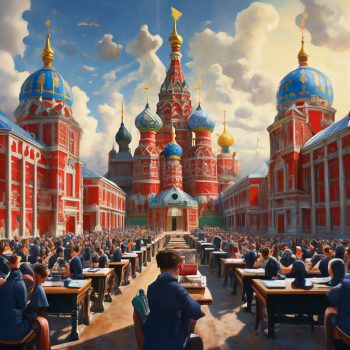Find out how to navigate the instruction system in Russia and select the optimal choice for your offspring with our beneficial manual for international citizen parents.
Amidst public and exclusive alternatives and vocational and scholarly paths, comprehending the educational system in Russia can appear complicated. Suppose the Russian learning structure varies from that of your homeland. In that case, the process of determining the appropriate selection for your child can also seem daunting.
Nonetheless, by conducting some investigation and preplanning, maneuvering the training system in Russia can be a comparatively smooth journey. This practical manual is here to aid you in sidestepping numerous of the traps linked with enrolling your offspring in school in Russia. It incorporates the subsequent:
- The training system in Russia;
- The three phases of instruction in Russia;
- Subjects and classes;
- The academic year and breaks in Russia;
- Initial learning in Russia;
- Elementary instruction in Russia;
- Public primary schools in Russia;
- Private primary schools in Russia;
- Intermediate instruction in Russia;
- State middle schools in Russia;
- Occupational schools in Russia;
- Private middle schools in Russia;
- The Global Diploma (IB) in Russia;
- Graduating in Russia;
- Educational aid for expat learners in Russia;
- Support for youngsters with distinct instructional demands (SEN) in Russia;
- Transferring schools in Russia;
- Home-based learning in Russia
The training system in Russia
Thankfully for international citizens, Russia possesses one of the most trustworthy instruction systems globally, situated 43rd in the World Economic Forum’s Global Competitiveness Report 2016-2017. Additionally, the nation’s adult proficiency ratio was 99.73% in 2018, ranking as the fourth-highest in Europe.
The training system in Russia
Russia’s instruction structure is supervised by the administration, and civic schools are free for all to enroll. Notwithstanding, the caliber of education dispensed at Russian civic institutions may fluctuate significantly contingent on the metropolis and the school itself. Therefore, thoroughly researching the alternatives is worthwhile when deliberating on which choice is optimal for your offspring.
Russia additionally accommodates private institutions, some of which are international institutions that serve children of various ethnicities. These are extremely favored among international citizens as they offer a multicultural setting and enable children to study the same syllabus as they would in their home country and in their mother tongue. That being expressed, they frequently levy substantial tuition charges and possess extensive waiting registers, thereby making it troublesome to secure a slot for your offspring unless applying well beforehand and possessing adequate financial funds
The three phases of education in Russia
Instruction in Russia is classified into three phases: foundational, fundamental universal, and subsequent. Initial learning kicks off at the age of six or seven and continues for four years. This is succeeded by five years of fundamental universal education and two to three years of subsequent education. Students can elect to finalize subsequent education at a regular school or opt to attend a professional preparation institution for that interval.
Subjects and classes
Upon concluding subsequent education, all students must pass the Unified Federal Examination (EGE) (Единый государственный экзамен, Yediny gosudarstvenny ekzamen) if aiming to progress to higher education. Tests in Russian and mathematics are compulsory, while other areas, including sciences, foreign languages, and arts, are discretionary.
Examinations in Russia
The Russian Department of Instruction sets the studyeducation system is generally considered more advanced, with better facilities and higher standards, than in rural areas.
Conclusion
In conclusion, the education system in Russia has its own unique characteristics and traditions, which differ from those in many Western countries. From the structured curriculum to the way holidays are organized, Russian schools provide a different educational experience for students. Understanding these differences can help expatriate families navigate the Russian education system more effectively.
The standard of learning is typically elevated in urban areas compared to rural regions. There is a broader selection of elementary schools to pick from in cities, in contrast to small towns and countryside areas that usually have just one.
Russian private primary educational institutions
If you are inclined to invest in securing a superior quality of education for your child, you might consider enrolling them in a private school. Russia boasts numerous privately-owned, fee-based schools, especially in major urban centers.
Primary schooling in Russia
 Tuition fees vary depending on the school and location, but generally, they tend to be high. For instance, classes at Moscow’s Zhukovka Gymnasium cost ₽80,000 – ₽110,000 monthly, while Aristos Lyceum in St. Petersburg charges ₽25,000 – ₽40,000 per month.
Tuition fees vary depending on the school and location, but generally, they tend to be high. For instance, classes at Moscow’s Zhukovka Gymnasium cost ₽80,000 – ₽110,000 monthly, while Aristos Lyceum in St. Petersburg charges ₽25,000 – ₽40,000 per month.
Foreign residents often aim to match their children’s educational standards with those of their home countries as closely as possible. If this resonates with you, you might consider sending your child to an international school. Moscow, specifically, provides a diverse array of international institutions following curricula from various nations like the United Kingdom, the United States, France, Germany, Italy, and Sweden. The majority of international schools in Russia cater to both primary and secondary education levels.
Russian secondary education
Secondary education in Russia is divided into two stages. Basic general education (основное общее образование, osnovnoye obshcheye obrazovaniye) spans four years, concluding with the Basic State Examination (Основной государственный экзамен, Osnovnoy gosudarstvenny ekzamen – ОГЭ/OGE), which determines the subsequent educational path for students.
Exam-taking secondary school students in Russia
Upon completing this examination, pupils who score sufficiently high marks can proceed to secondary general education (Среднее общее образование, sredneye obshcheye obrazovaniye), lasting two years and culminating with the Unified State Examination (EGE). Others may opt for vocational education during this period.
State-run secondary schools in Russia
Similar to public primary schools, public secondary schools in Russia are tuition-free and regulated by the Ministry of Education. Yet, akin to primary schools, the educational standards can significantly vary depending on the particular school and its location.
Every child is mandated to attend schooling until they reach 15 years of age, at which point they can leave with parental approval. During the initial four years of secondary education, students study Russian language, literature, a foreign language, math, IT, history, social studies, geography, physics, biology, chemistry, music, art, design & technology, and physical education.
This stint concludes with the Basic State Examination (OGE). Following this phase, students have the option to continue for an additional two years, undertake the Unified State Examination (EGE), transition to vocational education, or exit the education system altogether.
Vocational educational establishments in Russia
Russia features two types of vocational schools: colleges (колледж, kolledzh) and technical schools (техникум, tekhnikum). These institutions can groom students for a wide range of professions, spanning from aviation and veterinary science to secretarial roles and engineering. However, while both provide vocational training, colleges offer a more extensive educational experience and higher-level certifications compared to technical schools.
Students enrolled at a vocational school in Russia
During theirDuring the initial year of enrollment in a trade school, scholars will delve into relevant subjects relating to their selected occupation, alongside topics they previously encountered in earlier academic settings; for instance, the Russian dialect, mathematics, and historical studies. As they advance into the subsequent and concluding year, students will explore a broader array of subjects that are directly connected to their chosen field.
Russia accommodates a variety of private high schools, primarily located in bustling urban centers like Moscow and St. Petersburg. However, smaller towns such as Kazan and Penza also house similar educational institutions.
Typically, these institutions proffer a superior quality of instruction compared to public secondary schools, but come with a higher price tag than private primary schools. The tuition fees for private high schools can fluctuate significantly based on their geographical location. For instance, the First Moscow Gymnasium demands ₽150,000 monthly for educational purposes, whereas the Tete-a-Tete exclusive educational establishment in St. Petersburg requires an annual fee of ₽240,000.
If your preference entails your offspring receiving education in their native vernacular, a plethora of international schools within Russia provide linguistic instruction in English and various other languages. It is important to note that most of these institutions are concentrated in Moscow. Feel free to contact us for international schools in Russia.
Higher education in Russia

The International Baccalaureate (IB) curriculum in Russia pertains to an international educational scheme available to individuals aged three to 19 through schools across 138 nations. Owing to its extensive international acknowledgment, the IB program is a favored option among expatriate families, particularly those who frequently relocate.
More than 50 learning institutions in Russia offer International Baccalaureate accreditation. Among these, 47 provide instruction in English, with 11 presenting bilingual teaching in both Russian and English.
Achieving graduation in Russia necessitates students to undertake the Unified State Examination (EGE). This examination encompasses compulsory assessments in the Russian language and mathematics, as well as a variety of optional subjects that students can select from.
Secondary school graduates in Russia are competent in foreign languages (English, German, French, Spanish, and Chinese), physics, chemistry, biology, geography, literature, history, social sciences, and computer science. Scholars who attain commendable scores in these evaluations can proceed with tertiary education.
Educational assistance for expatriate scholars in Russia unveils certain constraints, as the national educational syllabus does not cater to non-Russian speaking children. The majority of public schools lack supplementary language classes or specialized support for individuals not fluent in Russian. Conversely, numerous private institutions do offer supplemental Russian language courses at an extra expense.
Assistance for children with particular educational requirements (SEN) in Russia spans various forms. For example, youngsters identified with developmental delays are eligible for supplementary ‘compensatory’ sessions within mainstream schools.
Within a Russian educational environment, there are provisions for students with profound learning challenges. These individuals may attend a ‘corrective’ residential school (коррекционная школа, korrektsionnaya shkola) tailored for those aged between eight and 21, with the objective of helping them acclimate to contemporary society rather than providing an extensive academic curriculum.
There are also numerous specialized institutions in Russia that cater to students with various physical disabilities. For instance, there are 80 schools for children with impaired vision, providing an additional twelfth year of education and smaller class sizes. Moreover, there are more than 200 specialized residential schools that serve students with hearing impairments.
Transitioning to different educational institutions in Russia
As per Russian laws, parents have the authority to relocate their child to a different school at any point without needing to justify their decision. However, a specific procedure must be adhered to.
Initially, parents are required to submit an official notification to the current school, declaring their intention to withdraw their child. Subsequently, the school will furnish them with all relevant paperwork pertaining to their child, which the parents must then give to the new school, along with an application for their child’s enrollment there.
Home-based education in Russia
Although still uncommon, homeschooling is gaining traction among Russian families. For instance, in 2015/16, only 8,200 Russian children were undergoing home education. Nevertheless, by 2018/19, this figure had surged to over 20,000.
Parental homeschooling in Russia
According to the Russian legislation, families possess the right to withdraw their children from traditional schooling and educate them at home. However, prior notice must be provided to the local education authority to initiate this process. If you opt for homeschooling your child, you may consider engaging private educators. The fees for a 45-minute lesson can range from ₽1,500 to ₽5,000, depending on the subject and the tutor’s level of expertise.



[…] Russian educational system […]
[…] Russian educational system […]